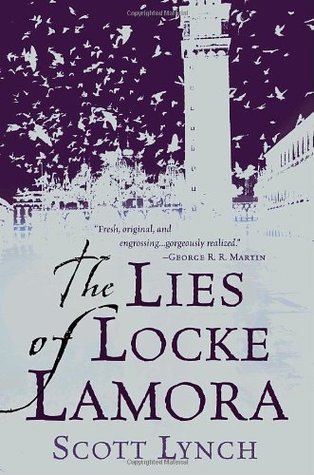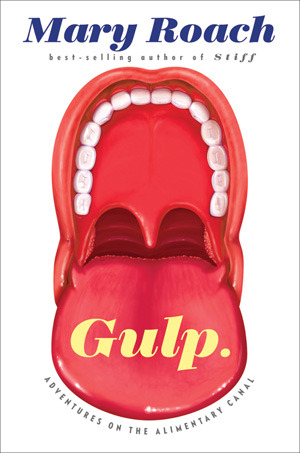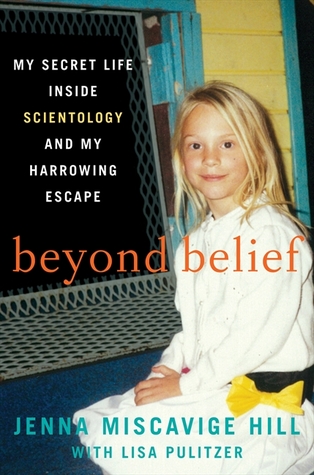#1136
Title: The Lies of Locke Lamora (Gentleman Bastard #1)
Author: Scott Lynch
Year: 2006
Publisher: Bantam Spectra
Pages: 499
Showing posts with label audiobook. Show all posts
Showing posts with label audiobook. Show all posts
Wednesday, October 15, 2014
Monday, September 15, 2014
Gulp: Adventures on the Alimentary Canal
#1133
Title: Gulp: Adventures on the Alimentary Canal
Author: Mary Roach
Year: 2013
Publisher: W. W. Norton
Pages: 352
Fun enough, though not as thorough as I'd have liked (e.g., virtually nothing about bile, the liver, the kidneys and other organs with metabolic function). It also kept promising to be gross, and it wasn't. I don't need it to be gross, but with that promise, I expect more about the composition of feces or urine-drinking cults or what have you.
Title: Gulp: Adventures on the Alimentary Canal
Author: Mary Roach
Year: 2013
Publisher: W. W. Norton
Pages: 352
Fun enough, though not as thorough as I'd have liked (e.g., virtually nothing about bile, the liver, the kidneys and other organs with metabolic function). It also kept promising to be gross, and it wasn't. I don't need it to be gross, but with that promise, I expect more about the composition of feces or urine-drinking cults or what have you.
Thursday, September 11, 2014
Wildwood (Wildwood Chronicles #1)
#1131
Title: Wildwood (Wildwood Chronicles #1)
Author: Colin Meloy
Illustrator: Carson Ellis
Year: 2011
Publisher: Balzer + Bray
Pages: 541
This low middle reader had its moments of charm and interest. However, it moves so slowly that it's almost unbearable.
Summary: Kind of Narnia, kind of Vinge's sapient dogs with guns from A Fire upon the Deep. In Oregon.
Title: Wildwood (Wildwood Chronicles #1)
Author: Colin Meloy
Illustrator: Carson Ellis
Year: 2011
Publisher: Balzer + Bray
Pages: 541
This low middle reader had its moments of charm and interest. However, it moves so slowly that it's almost unbearable.
Summary: Kind of Narnia, kind of Vinge's sapient dogs with guns from A Fire upon the Deep. In Oregon.
Tuesday, September 2, 2014
Beyond Belief: My Secret Life Inside Scientology and My Harrowing Escape
#1130
Title: Beyond Belief: My Secret Life Inside Scientology and My Harrowing Escape
Author: Jenna Miscavige Hill & Lisa Pulitzer
Year: 2013
Publisher: William Morrow/HarperCollins
Pages: 416
Yes, she whines, and her escape is more "nerve-wracking" than "harrowing," but Miscavige's story of the institutional abuses and coercion suffered by Sea Org members is consonant with those told by other ex-Scientologists. It's worth reading.
Title: Beyond Belief: My Secret Life Inside Scientology and My Harrowing Escape
Author: Jenna Miscavige Hill & Lisa Pulitzer
Year: 2013
Publisher: William Morrow/HarperCollins
Pages: 416
Yes, she whines, and her escape is more "nerve-wracking" than "harrowing," but Miscavige's story of the institutional abuses and coercion suffered by Sea Org members is consonant with those told by other ex-Scientologists. It's worth reading.
Wednesday, August 20, 2014
The Demon Under the Microscope: From Battlefield Hospitals to Nazi Labs, One Doctor's Heroic Search for the World's First Miracle Drug
#1124
Title: The Demon Under the Microscope: From Battlefield Hospitals to Nazi Labs, One Doctor's Heroic Search for the World's First Miracle Drug
Author: Thomas Hager
Year: 2006
Publisher: Harmony
Pages: 352
An interesting and useful account of the discovery and history of the sulfa drugs. It suffers from three major flaws: Skipping around in time, which makes the sequences hard to follow; repetitive information; and an overly dumbed-down presentation of not-very-technical material. It's also vague on the extent of IG Farben's Holocaust atrocities--they're mentioned in brief, but the overall attitude seems a bit apologist and dismissive.
Title: The Demon Under the Microscope: From Battlefield Hospitals to Nazi Labs, One Doctor's Heroic Search for the World's First Miracle Drug
Author: Thomas Hager
Year: 2006
Publisher: Harmony
Pages: 352
An interesting and useful account of the discovery and history of the sulfa drugs. It suffers from three major flaws: Skipping around in time, which makes the sequences hard to follow; repetitive information; and an overly dumbed-down presentation of not-very-technical material. It's also vague on the extent of IG Farben's Holocaust atrocities--they're mentioned in brief, but the overall attitude seems a bit apologist and dismissive.
The Chrysalids
#1123
Title: The Chrysalids
Author: John Wyndham
Year: 1955
Publisher: Michael Joseph
Pages: 200
A reasonably interesting post-apocalyptic novel, set in Canada for a change of scenery. One must accept the premise that the presumed nuclear devastation could cause many non-fatal mutations, but that's the starting point for many books in this genre.
I enjoyed the culture and world building, though Wyndham seems not to have made the best use of it. For example, I would expect a protagonist, or at least a foil character, to experience more moral qualms about the group's actions, which would have increased exploration of the idea, and the internal threat. Several characters appear to be simply discarded when no longer useful to the narrative.
The Wikipedia entry currently identifies "Sealand" as New Zealand. Unless Wyndham has confirmed this, I would have thought it was Zeeland. The Netherlands makes more sense for the distance traveled in a helicopter, though New Zealand's anti-nuclear policies make it culturally plausible.
A brief speech near the end caused me serious deja vu, since Jefferson Airplane cribbed/paraphrased it in "Crown of Creation":
In loyalty to their kind
They cannot tolerate our minds.
In loyalty to our kind
We cannot tolerate their obstruction!
Title: The Chrysalids
Author: John Wyndham
Year: 1955
Publisher: Michael Joseph
Pages: 200
A reasonably interesting post-apocalyptic novel, set in Canada for a change of scenery. One must accept the premise that the presumed nuclear devastation could cause many non-fatal mutations, but that's the starting point for many books in this genre.
I enjoyed the culture and world building, though Wyndham seems not to have made the best use of it. For example, I would expect a protagonist, or at least a foil character, to experience more moral qualms about the group's actions, which would have increased exploration of the idea, and the internal threat. Several characters appear to be simply discarded when no longer useful to the narrative.
The Wikipedia entry currently identifies "Sealand" as New Zealand. Unless Wyndham has confirmed this, I would have thought it was Zeeland. The Netherlands makes more sense for the distance traveled in a helicopter, though New Zealand's anti-nuclear policies make it culturally plausible.
A brief speech near the end caused me serious deja vu, since Jefferson Airplane cribbed/paraphrased it in "Crown of Creation":
In loyalty to their kind
They cannot tolerate our minds.
In loyalty to our kind
We cannot tolerate their obstruction!
Breakfast at Tiffany's
#1122
Title: Breakfast at Tiffany's
Author: Truman Capote
Year: 1958
Publisher: Random House
Pages: ~75
Holly Golightly bears a great superficial resemblance to Isherwood's Sally Bowles, though Sally is considerably less histrionic (and therefore, more genuinely tortured about who she is and what to make of her life). There's plenty of back story here, some of it quite desperate if examined out of the context of Capote's deceptively breezy story.
I am afraid that the colonoscopy prep GoLYTELY has forever affected my associations to this surname.
Title: Breakfast at Tiffany's
Author: Truman Capote
Year: 1958
Publisher: Random House
Pages: ~75
Holly Golightly bears a great superficial resemblance to Isherwood's Sally Bowles, though Sally is considerably less histrionic (and therefore, more genuinely tortured about who she is and what to make of her life). There's plenty of back story here, some of it quite desperate if examined out of the context of Capote's deceptively breezy story.
I am afraid that the colonoscopy prep GoLYTELY has forever affected my associations to this surname.
Wednesday, August 13, 2014
Moby-Dick; or, The Whale
#1120
Title: Moby-Dick; or, The Whale
Author: Herman Melville
Illustrator: Rockwell Kent
Year: 1851
Publisher: ICU Publishing/Kindle
Pages: 669
I've been reading classics electronically or on audiobook to fill in the gaps in my non-English Literature-major background. A lot of them have sermonizing sections. I was shocked to re-read Robinson Crusoe again and see how much religious discourse it includes. I think when we're younger, we blip right over the philosophizing, especially if the book is required reading. Moby-Dick, while rich in this regard, manages to incorporate the material effectively. It's funny and astute. I had deja vu for the first chunk--I'm not sure if I might have read the first chapters at some point, or read something where this was part of a pastiche, or just hung around New Bedford too much as a younger person.
Lemur 866 on The Straight Dope suggests reading as if Ishmael is a blogger. Some days he'll tell you about his friend, while some he'll talk about religion, and on others, the crafts and practices associated with whaling. This works for me (though I also see the novel as using both documentary and natural and philosophical sciences approaches, a la Justine, 120 Days of Sodom, The Golden Bough, or any natural history of its era).
Ishmael's many descriptions and reports serve two functions: To establish verisimilitude (i.e., that this is a factual report), and as a contrast to Ahab's monomaniacal obsession--Ishmael has wide-ranging conversations, is interested in all aspects of whaling, and has a relationship with the reader, whereas Ahab only wants to kill Moby-Dick. In this regard, it makes sense that Ishmael as a character fades from importance in the story, which increasingly focuses on Ahab's all-encompassing obsession. In a way, Ahab is already consumed and dead, while Ishmael, who will live to tell the tale, is engaged and alive.
I enjoyed this well-performed audiobook, and followed along in the linked Kindle edition for the pleasure of Kent Rockwell's illustrations (of which the below is a wonderful example).

Title: Moby-Dick; or, The Whale
Author: Herman Melville
Illustrator: Rockwell Kent
Year: 1851
Publisher: ICU Publishing/Kindle
Pages: 669
I've been reading classics electronically or on audiobook to fill in the gaps in my non-English Literature-major background. A lot of them have sermonizing sections. I was shocked to re-read Robinson Crusoe again and see how much religious discourse it includes. I think when we're younger, we blip right over the philosophizing, especially if the book is required reading. Moby-Dick, while rich in this regard, manages to incorporate the material effectively. It's funny and astute. I had deja vu for the first chunk--I'm not sure if I might have read the first chapters at some point, or read something where this was part of a pastiche, or just hung around New Bedford too much as a younger person.
Lemur 866 on The Straight Dope suggests reading as if Ishmael is a blogger. Some days he'll tell you about his friend, while some he'll talk about religion, and on others, the crafts and practices associated with whaling. This works for me (though I also see the novel as using both documentary and natural and philosophical sciences approaches, a la Justine, 120 Days of Sodom, The Golden Bough, or any natural history of its era).
Ishmael's many descriptions and reports serve two functions: To establish verisimilitude (i.e., that this is a factual report), and as a contrast to Ahab's monomaniacal obsession--Ishmael has wide-ranging conversations, is interested in all aspects of whaling, and has a relationship with the reader, whereas Ahab only wants to kill Moby-Dick. In this regard, it makes sense that Ishmael as a character fades from importance in the story, which increasingly focuses on Ahab's all-encompassing obsession. In a way, Ahab is already consumed and dead, while Ishmael, who will live to tell the tale, is engaged and alive.
I enjoyed this well-performed audiobook, and followed along in the linked Kindle edition for the pleasure of Kent Rockwell's illustrations (of which the below is a wonderful example).
Subscribe to:
Comments (Atom)







